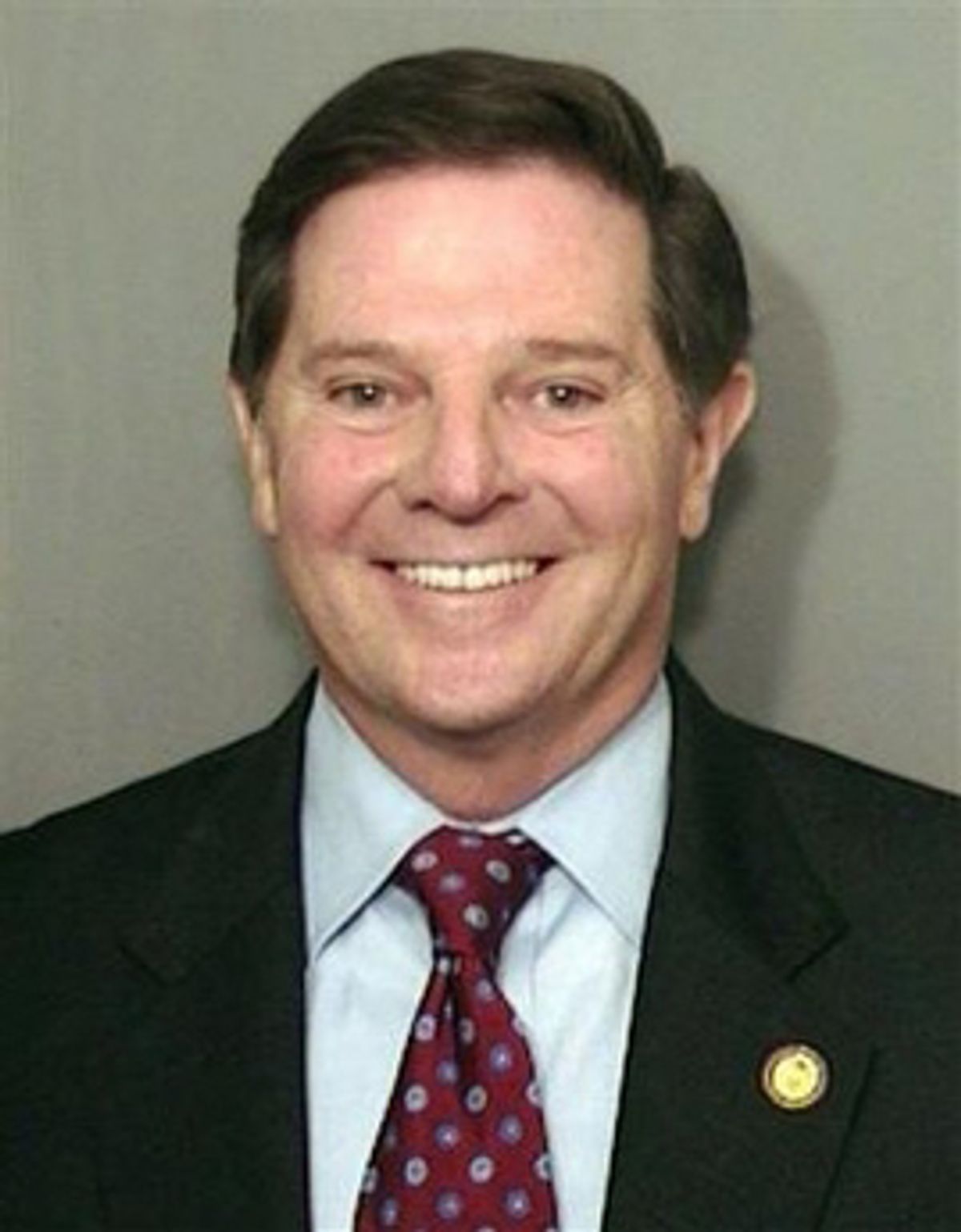Judging by the mainstream media's coverage of Tuesday's primary in Texas, Tom DeLay won a new lease on his congressional district by inflicting a decisive defeat on his Republican challengers. When the ballots were counted that evening, the former House majority leader and current Travis County criminal defendant had won 62 percent of the vote, against a combined total of 38 percent cast for his three opponents.
Appropriately enough, he celebrated at a fundraising party hosted by Washington power couple Bill Paxon and Susan Molinari, both of whom happen to be former members of Congress turned corporate lobbyists. Nothing better symbolized his confidence that the voters of his state's 22nd Congressional District would ignore his indictment by district attorney Ronnie Earle for corporate fundraising violations, his three ethics admonishments by fellow Republicans in Congress, his forced resignation as majority leader or his extensive involvement with convicted lobbyist Jack Abramoff.
In that sense DeLay was at least partially vindicated. Most of the Republicans he represents simply don't care about his transgressions.
Yet as the longtime incumbent surely understood, he had little reason to gloat as he raked in still more money from the influence peddlers. Within hours after the primary results were reported, Congressional Quarterly magazine revised its rating of his district's likely November outcome from "leans Republican" to "tossup." To C.Q.'s analysts, the Hammer still seems highly vulnerable to his Democratic adversary in the general election, former U.S. Rep. Nick Lampson. Indeed, despite his overwhelming primary victory, those professionals consider him more endangered now than ever.
That conclusion is easier to understand when this primary is considered within the full context of DeLay's electoral performance and the advantages he has always enjoyed.
None of the courageous Republican challengers could ever have been expected to defeat DeLay, an extraordinarily skilled politician who understands how to make the most of incumbency. All three were political unknowns, with no financial resources and no base of support in the district. The most successful was Tom Campbell, a former federal bureaucrat whose appeal was not enhanced by his Mormon faith, which is considered heretical or worse by the evangelical Protestants who dominate the Texas GOP. (The DeLay campaign slyly emphasized religion by mentioning Campbell's church and criticizing his fundraising in Utah.) Leaving aside that handicap, Campbell couldn't overcome his candidacy's most basic problem: DeLay outspent him by nearly 20-to-1. As of the last filing on Feb. 15, DeLay had laid out more than $2 million, while Campbell had spent a pathetic $119,000.
Despite that financial drowning, Campbell attracted 30 percent of the vote, with an additional 8 percent split between Pat Baig and Michael Fjetland. What that actually means is clearer when those numbers are contrasted with the incumbent's prior results. In the three Republican primaries that DeLay has faced since he was first elected in 1984, he has never received less than 80 percent of the vote, until now. Over the past four years, the percentage of Republicans who have had enough of the Hammer has doubled.
In the general election, DeLay will confront additional difficulties. As close observers of his reelection bid are well aware, the district he drew for himself in his controversial 2002 gerrymander is slightly less Republican in orientation than his old district. (He gave up a handful of Republican voters to bolster his colleagues in other districts.) Some communities in the new district don't know him very well, and in his single bid for reelection in the new district, he didn't perform especially well. Running against Democrat Richard Morrison in 2004, DeLay tallied only 55 percent, well behind President Bush and other candidates on the Republican ticket. That year his $3 million-plus campaign budget dwarfed Morrison's paltry expenditure, which totaled under $200,000.
None of these statistics suggests that Lampson will enjoy any substantial advantage over DeLay. Although the Democrat served four terms representing a different district, he lost his seat in 2002 in a less Republican district than the one he is seeking to win now. But there are certain other factors that may favor him in the fall. Former Republican Rep. Steve Stockman is planning to run as an independent -- and if he gets on the ballot, he may well draw a few votes from DeLay, as will the Libertarian Party candidate.
More important, Lampson's successful fundraising will enhance his chances. He has already raised nearly $2 million, well ahead of the target set for him by the Democratic Congressional Campaign Committee. Three weeks ago, at the time of the last filing, he actually had more cash on hand than DeLay. This Democrat is far better financed than any previous challenger, and while DeLay can be expected to shake down every Republican donor in sight, he will confront a fairer financial fight than ever before.
Finally there is the possibility that DeLay will be on trial in Travis County between now and Election Day, and the prospect of additional indictments and testimony in the Abramoff case. The Republicans represented by DeLay have endured considerable humiliation. This year we will learn how much more they can take.



Shares